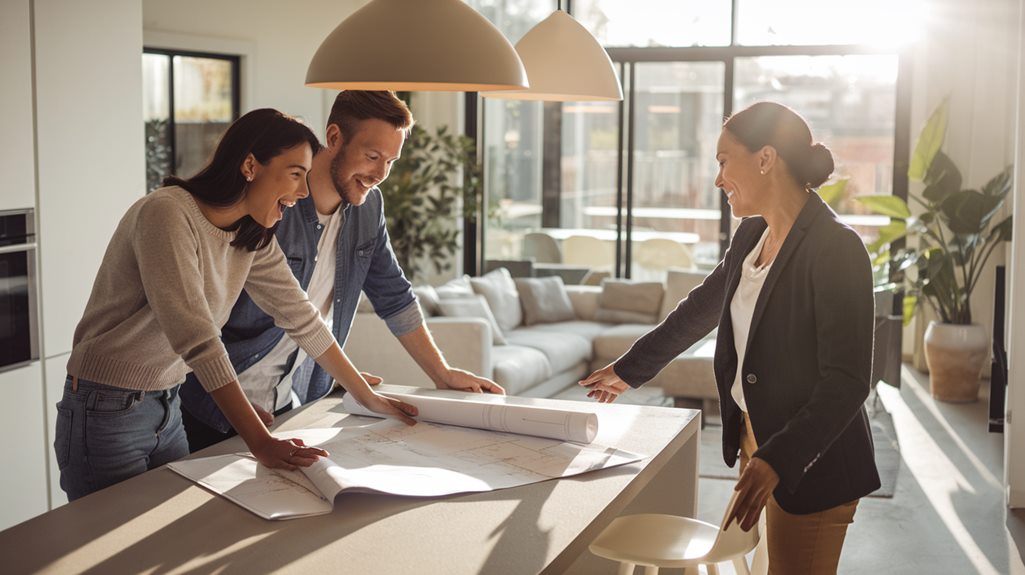Are you ready to buy your first home? Here's a simple checklist to help you out!
First, check how much money you have. Make a budget that you can stick to. This is very important!
Next, get a mortgage pre-approval. This helps you when looking for homes.
Then, look at different neighborhoods. Find one that fits your lifestyle.
After that, talk to a real estate agent. Pick someone who cares about what you want.
Don't forget to get a home inspection! This is to make sure the house is safe and in good shape.
When you are ready to buy, pay close attention to the final details and negotiations.
Take your time with each step. This will help make buying a home a fun and easy adventure!
Ready to start building equity in your own Michigan home? Get your personalized home loan quote today.
Assess Your Financial Health

Before you start looking for a home, it's important to check how you're doing with money. First, look at your credit score. This score helps banks decide if they'll lend you money and what interest rates to offer. A higher score means you can get better loan terms, which makes buying a home less stressful.
Next, think about any money you owe. Look at your debts and make a plan to pay them down. This will help your debt-to-income ratio, which is important when applying for a mortgage.
By keeping your debts under control, you not only make your money situation better but also join a group of responsible homeowners.
Taking these steps early makes buying a home easier and helps you reach your dreams.
Michigan residents, unlock the door to your new home. Request your home loan quote from Treeside Financial today.
Set a Realistic Budget
Making a budget is an important step when you want to buy a home. It helps you know how much money you can spend and find a home that's right for you. Here are some simple things to think about:
- Saving for a Down Payment: Try to save money by setting up automatic transfers to your savings or by spending less on things you don't really need.
- Be Ready for Surprises: Make sure your budget has some extra money in case you have unexpected costs.
- Think About Monthly Bills: Don't forget to include costs like electricity, water, insurance, and repairs in your budget.
- Keep Your Debts Low: If you have less debt, it can help you get a loan easier.
- Have an Emergency Fund: Save some money for things that might happen suddenly.
Being careful and organized with your budget helps you feel good about becoming a homeowner and living in a safe, happy place.
Get Pre-Approved for a Mortgage

Getting pre-approved for a mortgage is a smart step. It helps you know how much money you can spend on a house. This makes you a strong buyer when looking for a home.
To get pre-approved, you need to collect some important papers. These papers include your pay stubs, tax returns, and bank statements. Having these ready will make the process faster.
When you get pre-approved, it makes finding a home easier and helps you when you talk to sellers.
Benefits of Pre-Approval
Getting pre-approved for a mortgage can make buying a home much easier. It shows sellers that you're serious and ready to buy. To get pre-approved, a lender will check your credit score and look at different loan options. This helps you understand your money situation better.
Here are some ways pre-approval helps you:
- Know your budget: You'll see how much you can spend.
- Quicker closing: With your finances ready, you can move faster.
- Better at negotiating: Sellers will trust you more.
- More credibility: You'll look good compared to other buyers.
- Better loan terms: You might get nicer deals because of your credit score.
Pre-approval helps you feel confident on your way to owning a home.
Required Documents Checklist
When you want to get a mortgage, it helps to have a list of important documents ready. This makes the process easier and helps you get a good loan. Lenders want to understand your money situation. First, check your credit history to see how much you can borrow. Next, collect proof of your income and job to show how much money you make. Don't forget to grab your recent tax returns and bank statements to show you are financially stable. You'll also need ID, information about your assets, and a list of any debts you have. Here's a simple table to help you remember:
| Document Type | Examples | Why You Need It |
|---|---|---|
| Income Proof | Pay stubs, W-2 forms | To show your earnings |
| Financial Documents | Tax returns, bank statements | To show your stability |
| Personal ID and Assets | ID proof, asset statements | To confirm who you are and what you own |
Having these documents ready will help you feel confident when buying a home.
Research Potential Neighborhoods
When you want to buy a home, it's important to look at the things around it.
Check out parks where you can play, stores where you can shop, and ways to get around town.
Even if you don't have kids, look at schools because they can change how much the house is worth later.
Make sure to see how safe the area is by looking at crime rates and talking to the people who live there.
They can tell you what it's really like!
Evaluate Local Amenities
When you think about buying a home, picking the right neighborhood is very important. It can change how you live and feel every day.
Look at what's around you to make sure it fits what you want and need. Here are some things to think about that can make your life better:
- Parks where you can play and relax outside.
- Buses and trains that help you get around easily.
- Stores where you can buy food and other things you need.
- Fun events in the community where you can meet new friends.
- Doctors and hospitals that are easy to get to when you need help.
Checking out these things will help you find a neighborhood that's not just good for living, but also fun and exciting with places to play, eat, and explore!
Analyze School Districts
After you check out what fun things a neighborhood has, it's time to look at the schools. Good schools can make a neighborhood better and help your home be worth more.
Start by looking at how well the schools in the area do. Schools with high ratings usually mean kids learn a lot and families get involved.
You also need to know about school boundaries. These lines tell you which schools your kids can go to. Make sure the house you want is in the area for the best schools.
Talking to other parents and visiting the schools can give you great ideas about what it's like to learn there. When you choose neighborhoods with good schools, you're not just helping your kids learn; you're also finding a friendly place where people care about each other.
Assess Safety Levels
Making sure a neighborhood is safe is important for your peace of mind and for protecting your home's value.
Here are some simple ways to check if a neighborhood is safe:
- Look at Crime Maps: You can find maps online that show where crimes happen. Check local police websites for these maps.
- Visit at Different Times: Go to the neighborhood during the day and at night. This will help you see how busy or quiet it is.
- Talk to Neighbors: Chat with people who live there. They can tell you about any safety problems and if the community feels friendly.
- Check Street Lights: Good lighting on the streets is important. Well-lit areas are safer.
- Look for Emergency Services: Find out how close police and fire stations are. This can help you know how fast help can arrive if needed.
Make safety your top priority to ensure you feel comfortable and secure in your new home.
Find a Real Estate Agent

Finding the right real estate agent is very important when you want to buy a home. Start by looking for an agent who's the right qualities for you. You want someone who knows a lot about the area, has experience, and is good at negotiating. A great agent will listen to what you want and know the market really well.
To help you find the best agent, make a list of questions to ask. Find out how long they've been working, how many homes they've sold, and how they find special homes that others might miss.
It's also good to ask about how they like to communicate and when they're available. You want someone who makes you feel important and listens to you.
Conduct Home Inspections
When you're buying a home, it's really important to have a home inspection. This helps you make sure your new house is a good investment.
There are different types of inspections you can do. Here are some things to think about:
- Check the Structure: Look at the foundation, walls, and roof. Make sure there are no cracks or damage.
- Look at the Plumbing: Check for leaks and see if the water pressure is good. Make sure the pipes aren't too old.
- Examine the Electrical System: Make sure the wiring is safe and that all the outlets work.
- Inspect the Heating and Cooling: Check that the heating and air conditioning systems work well.
- Look for Pests: Make sure there are no bugs or damage from pests.
Doing these inspections helps you feel good about your new home.
You'll join a community of happy homeowners!
Finalize the Purchase

Congratulations! You're almost done buying your new home. This is very exciting!
First, think about how you talked with the seller. Make sure you got the best deal possible. Look over any last details that need to be fixed. If you have questions, ask your real estate agent for help.
Next, get ready for closing costs. These are extra fees like title insurance and appraisal costs. Knowing about these fees will help you avoid surprises and keep your money in check.
Good luck with your new home!







